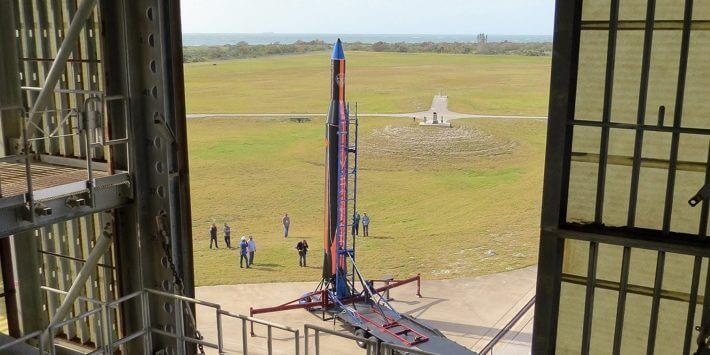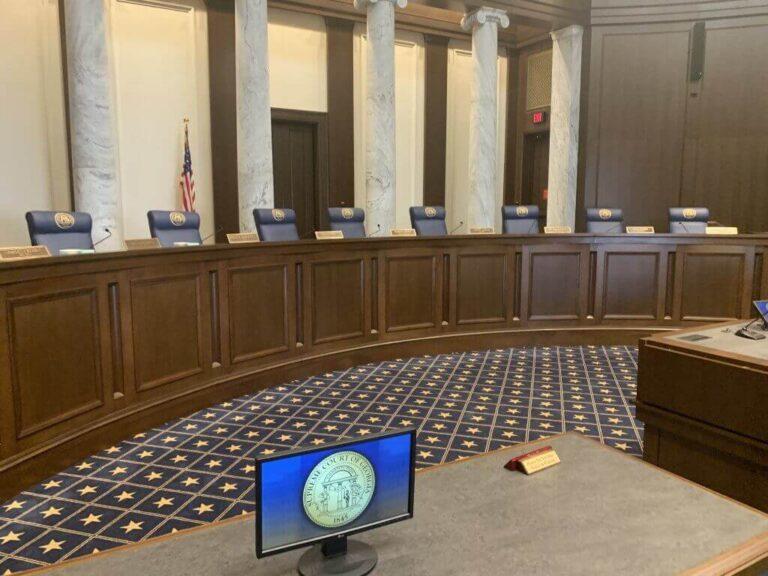
Caption
In February, the Georgia Supreme Court upheld a voter referendum that prevented the county from spending more money on a spaceport in Camden County, southeast Georgia.
Credit: Spaceport Camden rendering

In February, the Georgia Supreme Court upheld a voter referendum that prevented the county from spending more money on a spaceport in Camden County, southeast Georgia.
In the year since Camden County residents overwhelmingly voted against local rocket launches, county officials have spent hundreds of thousands of dollars trying to revive lofty plans to transform the region into Georgia’s space coast.
A Georgia Supreme Court ruling in February upholding county residents’ rights to reign in unpopular government decisions ended supporters’ hopes of building a spaceport in Southeast Georgia.
Camden County’s legal fees continued to mount as it appealed the case up to the state’s highest court in an attempt to overturn a March 2022 vote prohibiting the county from completing a $4.8 million real estate deal for the planned launch site.
The county also needed attorneys to defend itself in its long-running fight to keep spaceport spending details from the public.
A Camden County grand jury subpoena in February and a letter from the state attorney general helped spur hundreds of spaceport documents to get uploaded to the county website.
In the early stages of the county’s spaceport push, Camden resident Steve Weinkle was among the project’s biggest supporters. He wanted to watch rocket launches on his back porch while having parties. But his excitement waned as county commissioners kept spending money trying to secure federal permission to launch rockets near Cumberland Island.
Among the questionable expenses was the $51,000 spent on a fire risk assessment based on a nonexistent rocket, Weinkle said.
“After the Supreme Court ruled in February of this year, there shouldn’t have been any invoices,” he said. “The fact is, we’re not even seeing the full scope. These documents, which are being peddled out now over a period of months keep raising suspicions about why they were so persistent.”
Several attempts by the Georgia Recorder to get a response to the criticism from the Camden County administrator and commission chairman were unsuccessful. Currently, Camden County is fighting to recoup nearly $1 million it paid in advance for a purchase agreement with Union Carbide for land to use for the proposed spaceport.
Union Carbide filed a motion last week seeking to dismiss the Camden complaint about the contract it gave for exclusive rights to purchase the property where county leaders initially envisioned launching rockets as tall as the 230-foot SpaceX Falcon 9 into the stratosphere.
Attorneys for Camden argue that the county should be reimbursed for the $960,000 it has paid since 2015 after Union Carbide announced that it would not extend the option agreement for a fourth time.
“The county cites no legal authority to support its claim that a party must refund a county government’s lawful payments under a contract if the county repeals its prior approval of the contract and payments years later,” Union Carbide attorneys said in the legal motion.
Newly published spaceport invoices reveal millions of dollars spent since 2015 applying for a FAA license, as well as costs for attorneys, consultants, and other experts.
However, when the spaceport’s bottom line exceeded $10 million, a group of concerned residents managed to gather enough signatures to put the project up to the will of the voters.
The critics used a rarely invoked state law to force a referendum. Seventy-two percent of voters supported the binding resolution to prohibit the county from buying property to build the spaceport.
In spite of objections from residents, Camden officials continued to rack up more legal fees in its attempt to overturn the referendum results.

The Georgia Supreme Court blocked Camden County’s attempt to prevent the certification of a special election on March 8 in which residents voted against the purchase of land for commercial rocket launches. On Aug. 22, the same court will decide whether the Georgia constitutional provision used in the referendum was legal.
The county spent about $150,000 on legal fees in 2022 as it was represented in the referendum lawsuit by Atlanta’s Hall Booth Smith. During the Oct. 6 hearing, the firm’s attorney Pearson Cunningham argued that this type of referendum election is not permitted under the state’s constitution.
Following the Supreme Court ruling against the county on Feb. 7, Savannah-based attorney Hunter Maclean would collect another $6,450 from the county for work that included discussing a possible settlement of a spaceport-related open records lawsuit.
In addition, the county paid Kimley-Horn and Associates $225,000 for engineering, planning, and environmental services provided from 2019 through last month. A $5,600 invoice for January referenced the firm coordinating discussions among county and spaceport leaders, handling project management and for preparing “environmental talking points.”
During that time, the Fenimore Ventures Group met with prospective spaceport developers, vendors and officials from the Department of Defense and other federal agencies, according to the company’s invoices.
“What other purpose would this have served except to try to convince somebody going along with the project to overturn what the public was disclosing, which is that a real rocket has not been approved, and that the FAA should not approve a real rocket,” Weinkle said.
Camden also paid upwards of $10,000 last year to a lobbying firm led by former Georgia Department of Natural Resources Commissioner Joe Tanner. A positive evaluation by the department’s Coastal Resources Division was needed to ensure that the project met all state environmental regulations.
Longtime spaceport spokesman John Simpson was paid $7,500 per month through March 2022 by the county. Another $500 went toward brochures and posters promoting the spaceport’s benefits in the final weeks before the referendum.
In February, a technology specialist serving on a Camden County grand jury was dissatisfied with the county administration’s response to losing the Supreme Court case.
“The county’s response was that the law was wrong and that we should be rewriting the law,” St. Mary’s resident Christopher Walker said in an interview this week. “That flabbergasted me because, again, I didn’t understand how they could say that not only are the citizens wrong, but now the Supreme Court of Georgia is wrong.”
As the jury’s term came to a close, Walker had not much time to sift through the large jumble of records. The details of emails were impossible to discern without clicking on individual files on computer hard drives containing tens of thousands of emails.
The grand jury recommended that county officials be more transparent about future major projects, and that a special grand jury be convened to investigate the decisions to pursue the spaceport.
“No one will ever convince me that our subpoenas didn’t cause this data dump by the county,” Walker said.
In April, a Camden County judge sided with Georgia coastal environmental advocates One Hundred Miles after a yearslong quest to compel the county to comply with the Georgia Open Records Act after repeatedly claiming exemptions to keep details under wraps.
According to Brian Gist, a senior attorney at the Southern Environmental Law Center, which represents One Hundred Miles, the county continues to hold back on some documents.
“Camden County has produced thousands of documents that were first requested by One Hundred Miles several years ago,” Gist said. “We have begun the process of reviewing these documents and are still evaluating their contents. Camden County continues to withhold other documents, citing national security or other (state open records) exemptions. We are in conversations with Camden County about whether these documents need to be released as well.”
This story comes to GPB through a reporting partnership with Georgia Recorder.